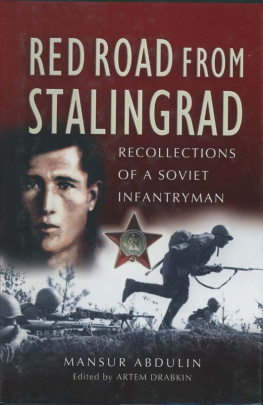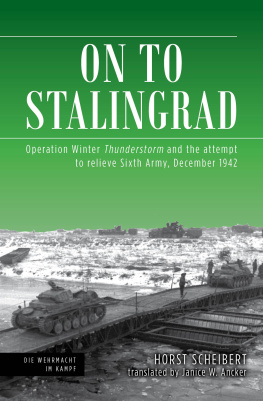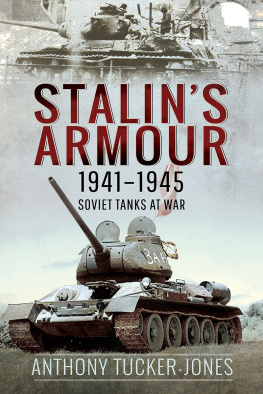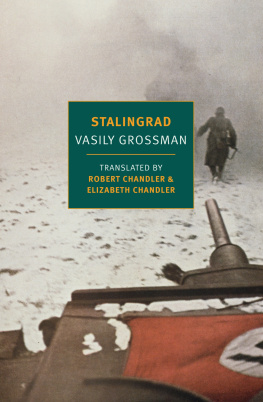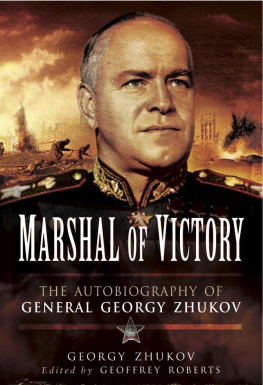First published 1975 by Westview Press, Inc.
Published 2019 by Routeldge
52 Vanderbilt Avenue, New York, NY 10017
2 Park Square, Milton Park, Abingdon, Oxon OX14 4RN
Routledge is an imprint of the Taylor & Francis Group, an informa business
Copyright 1975, 1984 by John Erickson
All rights reserved. No part of this book may be reprinted or reproduced or utilised in any form or by any electronic, mechanical, or other means, now known or hereafter invented, including photocopying and recording, or in any information storage or retrieval system, without permission in writing from the publishers.
Notice:
Product or corporate names may be trademarks or registered trademarks, and are used only for identification and explanation without intent to infringe.
Library of Congress Catalog Card Number: 84-50119
ISBN 13: 978-0-367-29561-5 (hbk)
A lengthy book stands most urgently in need of a short preface and this is no place to discourse on a wide range of Soviet contacts, but obviously such circumstances have directly affected the scope, content and organization of this study. The object of the present work can be set down briefly enough: it is designed to investigate the kind of war the Soviet Union waged, the nature of command decisions and the machinery of decision-making, the course of military operations, Soviet performance in the field and the economic effort behind the lines, the emergence of Soviet 'war aims' - beyond mere survival and, finally, the Soviet style of war. In sum, it is an attempt to probe how the Soviet system functioned under conditions of maximum stress: from this point of view it is less military history per se and might more properly be regarded as a form of social history. That this is no fanciful extrapolation is perhaps demonstrated by the nature of Soviet investigation of the 'Great Patriotic War' of 1941-5, for recollection of past tragedy and triumph is closely connected with present preoccupations about the efficacy of 'the system' and the image of a future war. The role of the 'surprise factor' springs to mind at once: both the military and the Party had their reputations as guarantors of the nation's security both to salvage and to reinforce, yet inevitably this proved to be the source of mutual recrimination. Simple assertions on the part of crude propagandists that the system worked were as unconvincing as they were irrelevant, if only because the military and operational technicalities of 'surprise attack' made nonsense of such sancta simplicitas. The Soviet military, on the other hand, found themselves in the unenviable position of claiming knowledge and awareness of the impending attack in 1941 yet thereby merely reinforcing criticism of them that it should have been met more energetically and effectively. Nor did Khrushchev's tactic in 1956 of heaping all the blame on Stalin - with the caricature of the man sniffing earth and spinning a globe to divine an operational decision - solve much: in the long run it served only to confuse the issue of the culpability and ineptitude of one man, the failings of the 'system' and performance in the field.
To put it somewhat differently, for almost two years the Soviet Union tried to fight the formidably modern war machine of Germany with a pattern or model of organization drawn from the far-off days of the Civil War, for this was the only one known at the outset to be viable. Such a modus operandi produced a specific and initially disastrous relationship between doctrine, technology and tradition (under which I include that Soviet amalgam of 'revolutionary will' with orthodox military professionalism - but the 'discipline of the revolver', to use a Civil War phrase, could not of itself fuel stranded tank columns, compensate for plain tactical incompetence and operational ineptitude). It was to take virtually three years of war before these elements were brought more effectively into balance - the doctrine was adjusted but more important implemented with requisite 'norms' of armament and equipment (not simply sheer numbers) and the relationship of 'will' to professional competence substantially re-fashioned. It is, I believe, a great error to think only of the Russian emergence from near catastrophe in terms of numbers alone and here I would insist that one must listen to Soviet explanations that 'numbers' do not tell the whole story: reduced to their essentials, Soviet explanations do turn on this triad of 'doctrine-technology-tradition'. To dismiss or to ignore this basic theme in Soviet military-historical writing (and reminiscence) means simultaneously missing what lessons have been derived from the last war and what signs have been discerned for the future. Nor is it a matter of that tired joke about generals preparing to fight the last war all over again: no doubt some aged senior Soviet commanders would like to, but the younger military technocrats turn less emotionally to their computers and to their studies in modern weapons technology, loss rates and cybernetics, using the war as a vast data base.
It is nonetheless true to say that a huge and persistent mythology still pervades the history of the 'Great Patriotic War', or the Russo-German war (even this search for a separate identification is revealing). It was in many respects, not least in its unbridled and atavistic savagery, a war set apart and here German attempts to minimize (or rationalize) their defeat combined with Soviet efforts to magnify their own victory have increased the general obfuscation. The obsessive cultivation of the 'heroic image' in the Soviet Union is itself designed to hinder rational explanation and effective investigation of military and civilian responses, yet such explanations are to hand - the consequences of technological inferiority (the 'quality and quantity of armaments'), the failure to exploit existing resources, the anachronism of the "revolutionary theory of morale, the inefficiency of the Party as an administrative instrument, the shortcomings of Stalin's 'super-centralization' and so on. And at the eye of the storm is Stalin - are these his shortcomings or those of Soviet society, or where, if at all, do these divide? It is not surprising that Soviet historians have been unwilling to grasp such political live wires, which still carry a dangerously high charge.
What, then, is the case for relying primarily upon Soviet sources and materials? With some 15,000 volumes now published on the 'Great Patriotic War' (including many invaluable items dating back to wartime days, though these are sometimes difficult to obtain) there is no immediate shortage of material. Add to these also the immense holdings of the captured German military documents, which contain a whole 'sub-archive' of items originally captured from the Russians as well as contemporary material on Soviet military performance - operational documents, intelligence appreciations, PW interrogations and data on the Red Army at large - plus information on the whole Soviet war effort. While these German collections provided both an additive and corrective to Soviet studies, let me hasten to add that my approach to many of these Soviet works was conditioned by contact and discussion with either the author or with the research group responsible for much of the work. Again, this is no place for a disquisition on the technicalities of Soviet sources, but I would stress the professionalism of the military researchers - the teams behind military histories bearing the names of Marshal Sokolovskii, Rokossovskii or Malinovskii, for example - or individual officers such as Colonel Proektor, or yet again such leading historians as Corresponding Member of the Academy of Sciences Professor A.M. Samsonov, himself the author of a major study of the Stalingrad battle. Though it would be impertinent and improper to associate Professor Samsonov with any of my findings (or my views), it would be churlish not to acknowledge my debt to him for much professional aid and counsel in making my way through a small mountain of books. Equally I was the beneficiary in discussions of Soviet findings with Soviet officer-historians, who displayed very considerable professional competence and a scrupulous regard for the integrity of source material (with ill-concealed criticism for those who did not). All this is to say that much Soviet work is far from propaganda' in the blatant or simplistic sense (though a somewhat perfervid patriotism is never entirely absent), an observation borne out by the reputation enjoyed by Voenno-istoricheskii Zhurnal (Military-Historical Journal) which is the vehicle of the professional military and its professional historians.





